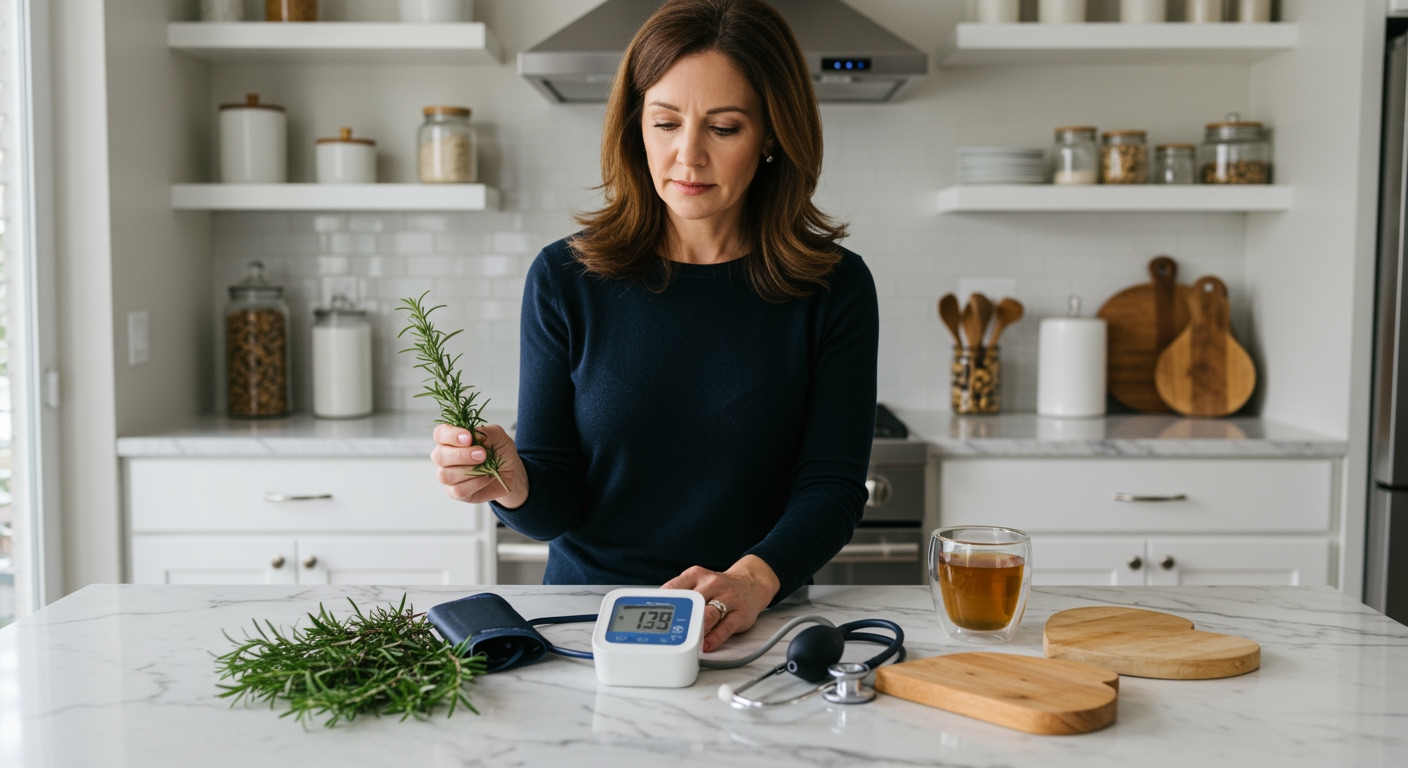✪ Key Takeaway: Hypotension patients should use rosemary cautiously as it may further lower already low blood pressure levels.
Introduction
Your doctor just told you that your blood pressure is too low, and now you are wondering about every herb in your kitchen cabinet.
You might be asking this question because rosemary appears in so many recipes and health articles, yet nobody talks about its effects on people with hypotension.
Hi, I am Abdur, your nutrition coach, and today I am going to explain whether hypotension patients should avoid rosemary and what you need to know about this popular herb.
What Does Rosemary Actually Do To Blood Pressure?
Rosemary contains rosmarinic acid and other compounds that can influence your cardiovascular system in multiple ways.
Research shows that rosemary can cause vasodilation, which means your blood vessels relax and widen.
When your blood vessels dilate, your blood pressure naturally decreases because there is less resistance for blood to flow through.
The herb also contains compounds that may affect your heart rate and the force of your heart contractions.
Studies indicate that rosemary extract can reduce both systolic and diastolic blood pressure readings in some people.
This blood pressure lowering effect happens because rosemary influences the renin-angiotensin system, which controls blood pressure regulation in your body.
✪ Fact: Rosemary contains over 40 different antioxidant compounds that can affect cardiovascular function.
How Much Rosemary Is Too Much For Hypotension?
The amount of rosemary that affects blood pressure varies significantly between culinary use and therapeutic doses.
Using rosemary as a cooking herb in normal amounts typically does not cause dramatic blood pressure changes.
However, concentrated rosemary extracts, supplements, or large amounts of rosemary tea can have stronger effects on your cardiovascular system.
A typical cooking portion might use one to two teaspoons of dried rosemary, which contains relatively low concentrations of active compounds.
Therapeutic doses used in studies often range from 500mg to 2000mg of rosemary extract, which is much higher than what you get from cooking.
If you have hypotension, you should be particularly careful with rosemary supplements and concentrated preparations rather than small cooking amounts.
✪ Pro Tip: Start with tiny amounts of rosemary and monitor your blood pressure response before increasing usage.
What Are The Warning Signs To Watch For?
Your body will give you clear signals if rosemary is making your hypotension worse.
Watch for increased dizziness or lightheadedness, especially when you stand up quickly after consuming rosemary.
Fatigue and weakness that seems worse than usual can indicate that your blood pressure has dropped too low.
Some people experience nausea or a feeling of faintness when their blood pressure drops significantly.
Blurred vision or difficulty concentrating can also signal that your brain is not getting enough blood flow due to excessive blood pressure reduction.
If you notice any of these symptoms after consuming rosemary, you should stop using it immediately and consult your healthcare provider.
✪ Note: Keep a blood pressure log when trying new herbs to track any changes in your readings.
Can You Still Use Rosemary Safely With Hypotension?
You do not necessarily have to eliminate rosemary completely if you have hypotension.
Small amounts used in cooking are generally safe for most people with low blood pressure.
The key is to use rosemary mindfully and pay attention to how your body responds.
Start with very small amounts and gradually increase only if you do not experience any negative symptoms.
Avoid rosemary supplements, concentrated extracts, or large quantities of rosemary tea if you have severe hypotension.
Always discuss herb usage with your doctor, especially if you take medications for blood pressure or other cardiovascular conditions.
Consider timing your rosemary consumption when you can monitor your blood pressure and have support available if needed.
✪ Pro Tip: Consume rosemary with meals to slow absorption and reduce potential blood pressure effects.
The Bottom Line
Hypotension patients should approach rosemary with caution because it can lower blood pressure further, but complete avoidance is not always necessary.
Smart herb choices require understanding your body and respecting its limits.
I would love to hear about your experiences with herbs and blood pressure management, so please share your questions or thoughts in the comments below.
References
At NutritionCrown, we use quality and credible sources to ensure our content is accurate and trustworthy. Below are the sources referenced in creating this article:





